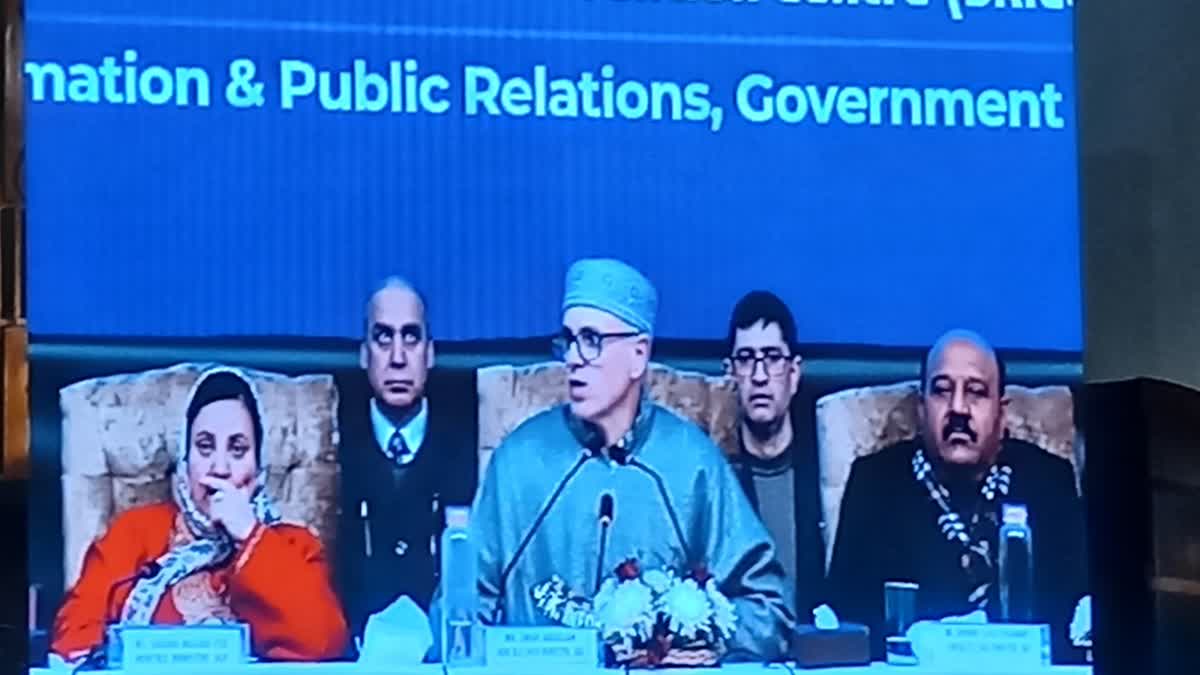Srinagar: Amid growing concerns among farmers over the conversion of orchards and agricultural land for development projects in Jammu and Kashmir, Chief Minister Omar Abdullah on Thursday assured the protection of the Union territory’s productive land.
This comes as a big relief to farmers, who have been protesting the acquisition of land for the National Institute of Technology (NIT) campus in south Kashmir’s Pulwama district.
Addressing a press conference here, Omar said that his government would ensure that non-productive land is used for the development of infrastructure and projects.
“We understand the concerns of the people, but we can't stop development. Development will have to go hand in hand with the concerns that people have. Now, to the best extent possible, we will have to ensure that whatever routes are to be selected for roads or railways are on non-productive lands,” Omar said in response to ETV Bharat's question about the land being surveyed for different government projects.
Omar was interacting with media persons in Srinagar. This was the CM's first media interaction to which more than 300 journalists were invited.
The chief minister said that farmers are expressing concerns and apprehensions about their productive land being surveyed or taken away for the development of railways, roads, and other buildings.
He said the government will set a benchmark so that productive land is protected and non-productive land is used for development projects. “No, all our lands are highly productive, but those that are, we should, to the fullest extent, avoid taking them over for any development projects,” he said.
Huge patches of agricultural and horticultural land have been surveyed by the Railways Department for the construction of a new railway track through apple orchards and paddy land in the Shopian, Kulgam, Pulwama, Budgam, and Baramulla districts.
The rail line is proposed to be extended to Pahalgam and Kupwara, and more than 5000 kanals of agricultural and horticultural land are being used for the laying of a new track.
The farmers and owners of the land are protesting and demanding that their land should not be taken for building railways and ring roads.
A recent controversy erupted in Newa village of Pulwama district in southern Kashmir, where District Magistrate Pulwama issued an order about identifying 4,830 kanals of state land for building a new campus for the NIT. The farmers who have converted this land into apple orchards met the chief minister at his residence and demanded its relocation.
Omar said that he told the farmers if they opposed its construction, he would order its relocation and find an alternate place for it.
“A delegation from Pulwama district came to meet about NIT at Newa village. They are concerned that they have almonds and other productive orchards on that land. I told them if the people of Newa don't want NIT there, we will relocate it to another place where the people of the area want it (to be built),” the chief minister said.
“Not everybody is opposed to the development here. If the people of Pulwama, Pampore, or any of those areas collectively, not five or six people, NIT is to be relocated from there, we will find another location. If we can relocate a place for Central University or AIIMS somewhere, we will find a place for NIT also,” he said.
He said that there are people who are ready to take on such development projects with open arms. “An MLA from an opposite party phoned me to help with land for NIT. So there are places where we can relocate this,” he said.
Sources said that Peoples Democratic Party (PDP) MLA from Tral Rafiq Ahmad Naik had phoned the chief minister and urged him to relocate the NIT to his Tral constituency.
Naik told ETV Bharat that he has requested the chief minister to relocate the NIT to Tral. “We have state land available in the Shaldraman area, which is barren land and can be used for the construction of an NIT,” Naik told ETV Bharat, adding that he is meeting the Director NIT Srinagar within a few days to appraise him about the availability of the land.
Jammu and Kashmir’s agricultural land is facing huge pressure from conversion into horticultural land and land being taken away by the government for building and construction of new roads and highways and now railway tracks.
As per the data of the agriculture department in Kashmir, the land availability for paddy cultivation has shrunk from 162,309 hectares in 2012 to 129,000 hectares in 2023—a decrease of 33,309 hectares. Because of this land shrinking and conversion, experts have predicted a lurking food crisis in the Valley where people use rice as a staple food.
The chief minister said that the government will strike a balance so that the productive land is saved from rampant conversion and development.
“We will have to find a balance between our development needs and also protecting our productive agricultural lands,” he said.
About the mining of sand, gravel, and stones in the water sources of the Valley, like the river Jhelum and other water streams, the chief minister told ETV Bharat that his government will review the process of mining so that the water bodies are saved and environmental balance is maintained.
Read More



